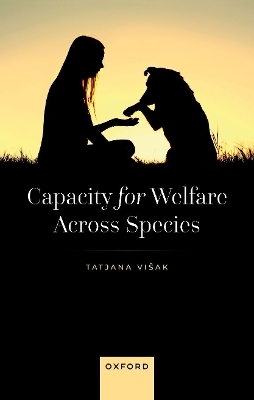
Capacity for Welfare across Species
Seiten
2022
Oxford University Press (Verlag)
978-0-19-288220-2 (ISBN)
Oxford University Press (Verlag)
978-0-19-288220-2 (ISBN)
Is my carefree dog better off than I am? Will my money improve welfare more if I spend it helping people or chickens? If we want to compare welfare across species, we first need to explore whether welfare subjects of different species have the same or a different capacity for welfare. Tatjana Višak argues that they do.
Is my dog, with his joyful and carefree life, better off than I am? Do hens in battery cages have worse lives than cows at pasture? Will my money improve welfare more if I spend it on helping people or if I benefit chickens? How can we assess the harm of climate change for both humans and non-humans? If we want to systematically compare welfare across species, we first need to explore whether welfare subjects of different species have the same or rather a different capacity for welfare.
According to what seems to be the dominant philosophical view, welfare subjects with higher cognitive capacities have a greater capacity for welfare and are generally much better off than those with lower cognitive capacities. Višak carefully explores and rejects this view. She argues instead that welfare subjects of different species have the same capacity for welfare despite different cognitive capacities. This book prepares the philosophical ground for comparisons of welfare across species. It will inform and inspire ethicists and animal welfare scientists alike, as well as a broader readership interested in wellbeing, animals, and ethics. Besides different views about capacity for welfare across species, the book discusses animal capacities, moral status, harm of death, whether bringing additional well-off individuals into existence is a good thing, and practical implications of these topics for counting and comparing the welfare of animals of different species.
Is my dog, with his joyful and carefree life, better off than I am? Do hens in battery cages have worse lives than cows at pasture? Will my money improve welfare more if I spend it on helping people or if I benefit chickens? How can we assess the harm of climate change for both humans and non-humans? If we want to systematically compare welfare across species, we first need to explore whether welfare subjects of different species have the same or rather a different capacity for welfare.
According to what seems to be the dominant philosophical view, welfare subjects with higher cognitive capacities have a greater capacity for welfare and are generally much better off than those with lower cognitive capacities. Višak carefully explores and rejects this view. She argues instead that welfare subjects of different species have the same capacity for welfare despite different cognitive capacities. This book prepares the philosophical ground for comparisons of welfare across species. It will inform and inspire ethicists and animal welfare scientists alike, as well as a broader readership interested in wellbeing, animals, and ethics. Besides different views about capacity for welfare across species, the book discusses animal capacities, moral status, harm of death, whether bringing additional well-off individuals into existence is a good thing, and practical implications of these topics for counting and comparing the welfare of animals of different species.
Tatjana Višak has a BA in psychology, an MA in political science, and a PhD in philosophy. She has been a lecturer and researcher in philosophy at various universities across the globe over the past 20 years. She is currently working in the field of psychology. She is the author of Killing Happy Animals - Explorations in Utilitarian Ethics (Palgrave MacMillan, 2013) and editor of The Ethics of Killing Animals (Oxford University Press, 2016). She has published more than 30 papers about welfare and animal ethics in scientific journals and books.
| Erscheinungsdatum | 13.02.2023 |
|---|---|
| Verlagsort | Oxford |
| Sprache | englisch |
| Maße | 145 x 223 mm |
| Gewicht | 330 g |
| Themenwelt | Geisteswissenschaften ► Philosophie ► Ethik |
| Sozialwissenschaften ► Soziologie | |
| ISBN-10 | 0-19-288220-1 / 0192882201 |
| ISBN-13 | 978-0-19-288220-2 / 9780192882202 |
| Zustand | Neuware |
| Haben Sie eine Frage zum Produkt? |
Mehr entdecken
aus dem Bereich
aus dem Bereich


